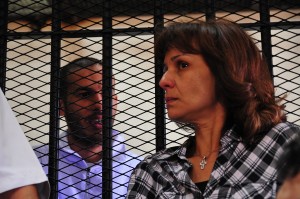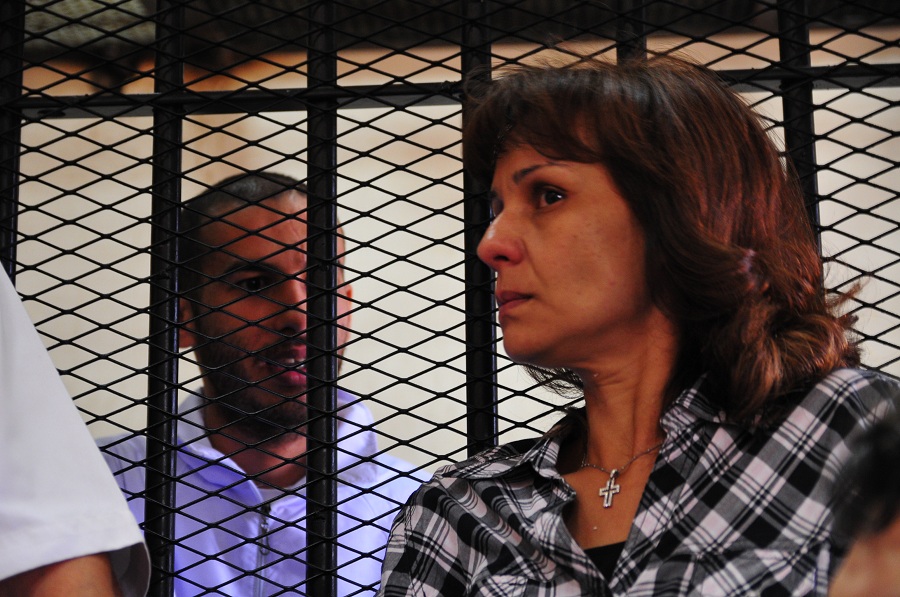
Hassan Ibrahim
Detaining children is the latest in an alarming trend of Egyptians facing prison sentences over contempt of religion. Hundreds could face the same treatment by the end of the year according to a human rights organisation. More worrying is how those facing such charges appear to be disproportionately Coptic Christians.
Two Coptic Christian children were arrested and are being held in police custody after a Salafi sheikh reported they defaced a copy of the Quran.
Mina Farag (ten) and Nabil Rizk (nine), from the Ezbet Marco area in southern Beni Suef, were accused by Ibrahim Mohamed, a Salafi sheikh, on Sunday of ripping two pages from the Islamic holy book and urinating on them.
According to Ishak Ibrahim, a researcher with the Egyptian Initiative for Personal Rights (EIPR), Mohamed turned the children to a local priest at the Angel Michael church, Ishak Qastour and complained to him about the incident.
Qastour assured Mohamed that all Christians in Ezbet Marco respect Islam and the Quran. The children denied the incident and said they found the pages on the street. According to Ibrahim, one of the children is illiterate.
Mohamed was unsatisfied with Qastour’s response and reported the incident to the police.
“There was a friendly meeting held on Monday at one of the Muslim residents’ house, sponsored by the security forces, in which Muslims and Christians met and affirmed respect for each other,” said Ibrahim.
Nonetheless, the children were arrested and taken to Al-Fashn police station for questioning where they again denied the incident.
According to Adel Ramadan, who is in charge of the contempt of religion file at the EIPR, the children were charged with contempt of religion and transported to a Beni Suef juvenile detention facility.
“The children will likely get lighter sentences because they are under 15 years old but will be subject to the same law that adults are charged under,” said Ramadan.
Ramadan and Ibrahim both said there had been a rapid increase in contempt of religion cases recently.
“These incidents are on the rise and we are seeing an increase in contempt of religion cases and unfortunately most of the cases end up with jail sentences,” said Ibrahim.
Nevine El-Sayed, a Coptic Christian social studies teacher in an Assiut middle school, was arrested Saturday on contempt of religion charges.
El-Sayed, who is nine months pregnant, was accused by one of her 40 students of insulting the Muslim prophet Muhammad. According to Ibrahim, El-Sayed was explaining the chapter on the rise of Islam in the social studies curriculum when she described Muhammad as growing up in a poor family.
Islamic tradition does portray Muhammad as growing up poor and having to work as a shepherd before later becoming a successful merchant, although it also describes his family as being of part of the local nobility.
It is unclear what El-Sayed said that offended Islam in the eyes Mohamed Hesham, the student who reported her. No other students did so.
Members of the Salafi Calling in Assiut had escorted the student to the police station and helped him file the case, according to a statement made by Motaz Beshink, spokesperson for Al-Nour Party, the Salafi Calling’s political wing.
Bishoy Al-Behery, another Coptic Christian schoolteacher, was sentenced to six years in prison on 19 September. He was convicted by Sohag court and received three years for contempt of religion, two for insulting the president, and one for insulting a private citizen, the plaintiff in the case.
Al-Behery was tried over statements he allegedly made on his Facebook account. His lawyers argued that his account was hacked, while his father released a statement Wednesday saying another person had created an account using Bishoy’s information to frame him and claimed to have a recorded confession from this individual.
Alber Saber, a political activist and blogger, was also arrested for comments made over social networking websites. He was initially charged with spreading a clip from the film Innocence of Muslims deemed offensive to Islam, although the prosecution found no evidence of him sharing the film on any of his social media accounts.
The prosecution instead charged Saber with contempt of religion over statements he made in a private video made in 2008 found on a CD in his home. Saber is accused of making comments rejecting the existence of a god and “insulting the Muslim and Christian faiths” as well as “claiming humanity originated from nature.”
He was arrested and held on remand for 15 days before being referred to Al-Marg Misdemeanor Court to face charges that could result in up to five years in prison. He remains in custody.
In contrast, Abu Islam Abdallah, a Salafi preacher who burned the Christian Bible in front of the American embassy as part of the protest denouncing the Innocence of Muslims film. There is video evidence of Abu Islam and his son burning the Bible and he has been charged with contempt of religion as well.
Abu Islam’s trial started on Saturday and he was charged even earlier but remains free, unlike Saber who has been in preventative detention since before his trial started on 26 September. Both trials have been adjourned, Abu Islam’s to 14 October and Saber’s to 17 October.
Ramadan said there have been about 20 cases and that only two of the cases, those of Abu Islam and famous comedian Adel Imam, were against Muslims, with the rest being Coptic Christians who were charged.
He believes the problem started when the public prosecution started “playing the role of religious courts,” which have led to these “inquisition tribunals.”
“There are always gatherings outside the prosecution or trial as well which results in popular pressure meaning we cannot guarantee a fair trial or investigation,” said Ibrahim.
Nevine El-Sayed’s family, for example, was threatened with their house getting burned and had to leave Assiut. She could not find a lawyer once it was revealed she was being accused of contempt of religion, although she was eventually released. The case is still being investigate, however.
Similarly, Bishoy Al-Behery had to enter the courthouse through the backdoor to avoid clashes with Salafi protestors, whose demonstrations caused the trial’s venue to be changed several times.
The most apparent of these cases, however, is Saber’s. His arrest came after his mother called the police, seeking protection after their Ezbet El-Nakhl home was surrounded by an angry mob threatening to burn it and the nearby church.
The police instead arrested Saber in what appeared to be a coordinated plan with the people gathered outside his home. His mother was forced to leave her house under threat of burning and has yet to be able to return.
Ramadan said that such cases were not only becoming common place, but that the Egyptian Initiative for Personal Rights expected such instances to grow even further.
“We were shocked at the office to hear about children being arrested and facing criminal charges. Pretty soon the elderly will face the same fate. We predict that by the end of the year, hundreds of Egyptians will face trials over contempt of religion,” said Ramadan.
